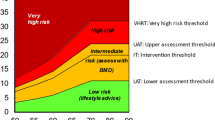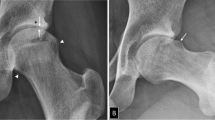Abstract
The UK National Osteoporosis Society (NOS) has recently issued new guidelines on the use of peripheral x-ray absorptiometry (pDXA) devices in managing osteoporosis. The NOS guidelines recommend a triage approach in which patients’ bone mineral density (BMD) measurements are interpreted using upper and lower thresholds specific to each type of pDXA device. The thresholds are defined so that patients with osteoporosis at the hip or spine are identified with 90% sensitivity and 90% specificity. Patients with a pDXA result below the lower threshold are likely to have osteoporosis at the hip or spine, patients with a result above the upper threshold are unlikely to have osteoporosis, while those between the two thresholds require a hip and spine BMD examination for a definitive diagnosis. This report presents data from a multicenter study to establish the triage thresholds for a range of pDXA devices in use in the UK. The subjects were white female patients aged 55–70 years who met the normal referral criteria for a BMD examination. For each device, at least 70 women with osteoporosis at the hip or spine and 70 women without osteoporosis were enrolled. All women had hip and spine BMD measurements using axial DXA systems that were interpreted using the National Health and Nutrition Examination Survey (NHANES) reference range for the hip and the manufacturers’ reference ranges for the spine. Data are presented for five different devices: the Osteometer DTX-200 (forearm BMD), the Schick AccuDEXA (hand BMD), the GE Lunar PIXI (heel BMD), the Alara MetriScan (hand BMD), and the Demetech Calscan (heel BMD). The clinical measurements were supplemented by theoretical modeling to estimate the age dependence of the triage thresholds and the effect of the correlation coefficient between pDXA and axial BMD on the percentage of women referred for an axial BMD examination. In summary, this study provides thresholds for implementing the new NOS guidelines for managing osteoporosis using pDXA devices. The figures reported apply to postmenopausal white women aged 55–70 years who meet the conventional criteria for a BMD examination. The results confirm that the thresholds are specific to each type of pDXA device and that the NOS triage algorithm requires 40% of women to have an axial DXA examination.




Similar content being viewed by others
References
Cooper C, Campion G, Melton LJ (1992) Hip fractures in the elderly; a world-wide projection. Osteoporosis Int 2:285–289
Dolan P, Torgerson DJ (1998) The cost of treating osteoporotic fractures in the United Kingdom female population. Osteoporosis Int 8:611–617
Black DM, Cummings SR, Karpf DB, Cauley JA, Thompson DE, Nevitt MC, Bauer DC, Genant HK, Haskell WL, Marcus R, Ott SM, Torner JC, Quandt SA, Reiss TF, Ensrud KE (1996) Randomised trial of the effect of alendronate on risk of fracture in women with existing vertebral fractures. Lancet 348:1535–1541
McClung MR, Geusens P, Miller PD, Zippel H, Bensen WG, Roux C, Adami S, Fogelman I, Diamond T, Eastell R, Meunier PJ, Reginster J-Y (2001) Effect of risedronate treatment on hip fracture risk in elderly women. N Engl J Med 344:333–340
Neer RM, Arnaud CD, Zanchetta JR, Prince R, Gaich GA, Reginster J-Y, Hodsman AB, Eriksen EF, Ish-Shalom S, Genant HK, Wang O, Mitlak BH (2001) Effect of recombinant human parathyroid hormone (1–34) fragment on spine and non-spine fractures and bone mineral density in postmenopausal osteoporosis. N Engl J Med 344:1434–1441
Kanis JA, Delmas P, Burckhardt P, Cooper C, Torgerson D, on behalf of the European Foundation for Osteoporosis and Bone Disease (1997) Guidelines for diagnosis and treatment of osteoporosis. Osteoporosis Int 7:390–406
Royal College of Physicians (1999) Osteoporosis: clinical guidelines for prevention and treatment. RCP, London
National Osteoporosis Society (2002) Position statement on the reporting of dual x-ray absorptiometry (DXA) bone mineral density scans. National Osteoporosis Society, Bath, England
Marshall D, Johnell O, Wedel H (1996) Meta-analysis of how well measures of bone mineral density predict occurrence of osteoporotic fractures. BMJ 312:1254–1259
Stone KL, Seeley DG, Lui L-Y, Cauley JA, Ensrud K, Browner WS, Nevitt MC, Cummings SR (2003) BMD at multiple sites and risk of fracture of multiple types: long-term results from the Study of Osteoporotic Fractures. J Bone Miner Res 18:1947–1954
Eastell R (1998) Treatment of postmenopausal osteoporosis. N Engl J Med 338:736–746
WHO Technical Report Series 843 (1994) Assessment of fracture risk and its application to screening for postmenopausal osteoporosis. World Health Organization, Geneva
Genant HK, Engelke K, Fuerst T, Gluer C-C, Grampp S, Harris ST, Jergas M, Lang T, Lu Y, Majumdar S, Mathur A, Takada M (1996) Noninvasive assessment of bone mineral and structure: state of the art. J Bone Miner Res 11:707–730
Glüer C-C, Jergas M, Hans D (1997) Peripheral measurement techniques for the assessment of osteoporosis. Semin Nucl Med 27:229–247
Stevens MR, Adams JE, Reid DM (2004) National Osteoporosis Society national survey of bone densitometry provision. Osteoporosis Int 15: S49 (abstract)
Jones T, Davie M (1998) Bone mineral density at distal forearm can identify patients with osteoporosis at spine or femoral neck. Br J Rheum 37:539–543
Fordham JN, Chinn DJ, Kumar N (2000) Identification of women with reduced bone density at the lumbar spine and femoral neck using BMD at the os calcis. Osteoporosis Int 11:797–802
Hans D, Hartl F, Krieg MA (2003) Device-specific weighted T-score for two quantitative ultrasounds: operational propositions for the management of osteoporosis for 65 years and older women in Switzerland. Osteoporosis Int 14:251–258
Faulkner KG, Von Stetton E, Miller P (1999) Discordance in patient classification using T-scores. J Clin Densitometry 2:343–350
Lu Y, Genant HK, Shepherd J, Zhao S, Mathur A, Fuerst TP, Cummings SR (2001) Classification of osteoporosis based on bone mineral densities. J Bone Miner Res 16:901–910
National Osteoporosis Society (2004) Position statement on the use of peripheral x-ray absorptiometry in the management of osteoporosis. National Osteoporosis Society, Bath, England
Hanson J (1997) Standardisation of femur BMD. J Bone Miner Res 12:1316–1317
Faulkner KG, Roberts LA, McClung MR (1996) Discrepancies in normative data between Lunar and Hologic DXA systems. Osteoporosis Int 6:432–436
Diem K, Lentner C (1970) Documenta Geigy: scientific tables, 7th edn. CIBA-Geigy, Basel
Patel R, Blake GM, Fogelman I (2004) An evaluation of the National Osteoporosis Society position statement on the use of peripheral x-ray absorptiometry. Osteoporosis Int 15:497–504
Trumpler RJ, Weaver HF (1962) Statistical astronomy. Dover Publications, New York, pp 42–68
Blake GM, Patel R, Knapp KM, Fogelman I (2003) Does the combination of two BMD measurements improve fracture discrimination? J Bone Miner Res 18:1955–1963
Altman DG (1991) Practical statistics for medical research. Chapman Hall, London, pp 210–211
Blake GM, Fogelman I (2001) Peripheral or central densitometry: does it matter which technique we use? J Clin Densitometry 4:83–96
Miller PD, Siris ES, Barrett-Connor E, Faulkner KG, Wehren LE, Abbott TA, Chen Y-T, Berger ML, Santora AC, Sherwood LM (2002) Prediction of fracture risk in postmenopausal white women with peripheral bone densitometry: evidence from the National Osteoporosis Risk Assessment. J Bone Miner Res 17:2222–2230
Cummings SR, Black DM, Thompson DE, Applegate WB, Barrett-Connor E, Musliner TA, Palermo L, Prineas R, Rubin SM, Scott JC, Vogt T, Wallace R, Yates AJ, LaCroix AZ (1998) Effect of alendronate on risk of fracture in women with low bone density but without vertebral fractures: results from the Fracture Intervention Trial. JAMA 280:2077–2082
Ettinger B, Black DM, Mitlak BH, Knickerbocker RK, Nickelsen T, Genant HK, Christiansen C, Delmas PD, Zanchetta JR, Stakkestad J, Gluer CC, Krueger K, Cohen FJ, Eckert S, Ensrud KE, Avioli LV, Lips P, Cummings SR (1999) Reduction of vertebral fracture risk in postmenopausal women with osteoporosis treated with raloxifene: results from a 3-year randomised clinical trial. JAMA 282:637–645
Harris ST, Watts NB, Genant HK, McKeever CD, Hangartner T, Keller M, Chesnut CH, Brown J, Eriksen EF, Hoseyni MS, Axelrod DW, Miller PD (1999) Effects of risedronate treatment on vertebral and non-vertebral fractures in women with postmenopausal osteoporosis. JAMA 282:1344–1352
Chesnut CH, Skag A, Christiansen C, Recker R, Stakkestad JA, Hoiseth A, Felsenberg D, Huss H, Gilbride J, Schimmer RC, Delmas PD (2004) Effects of oral ibandronate administered daily or intermittently on fracture risk in postmenopausal osteoporosis. J Bone Miner Res 19:1241–1249
National Osteoporosis Society (2001) Position statement on the use of peripheral x-ray absorptiometry in the management of osteoporosis. National Osteoporosis Society, Bath, England
Kanis JA, Borgstrom F, De Laet C, Johansson H, Johnell O, Jonsson B, Oden A, Zethraeus N, Pfleger B, Khaltaev N (2005) Assessment of fracture risk. Osteoporosis Int 16:581–589
Author information
Authors and Affiliations
Corresponding author
Additional information
On behalf of the National Osteoporosis Society Bone Densitometry Forum.
Rights and permissions
About this article
Cite this article
Blake, G.M., Chinn, D.J., Steel, S.A. et al. A list of device-specific thresholds for the clinical interpretation of peripheral x-ray absorptiometry examinations. Osteoporos Int 16, 2149–2156 (2005). https://doi.org/10.1007/s00198-005-2018-x
Received:
Accepted:
Published:
Issue Date:
DOI: https://doi.org/10.1007/s00198-005-2018-x




